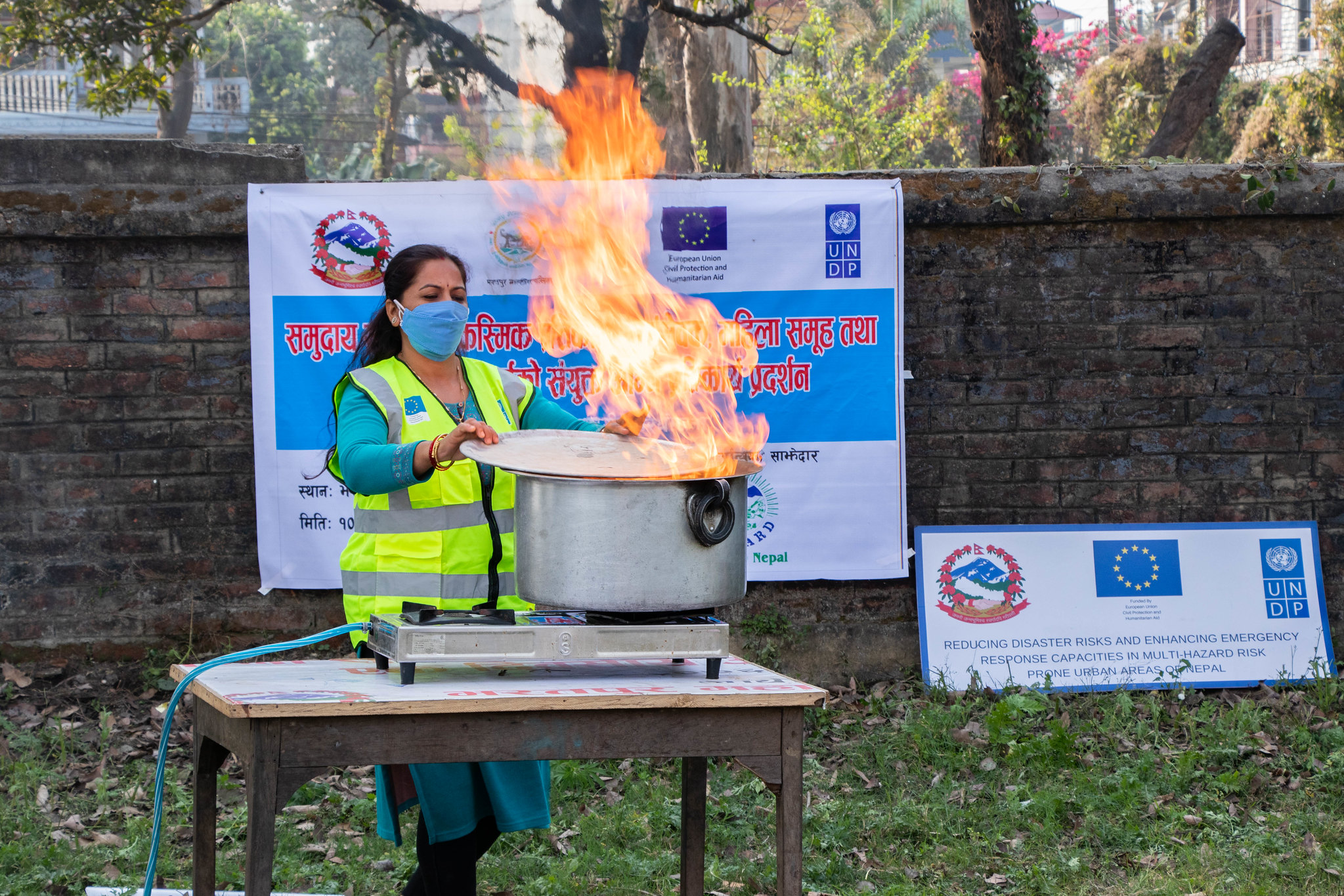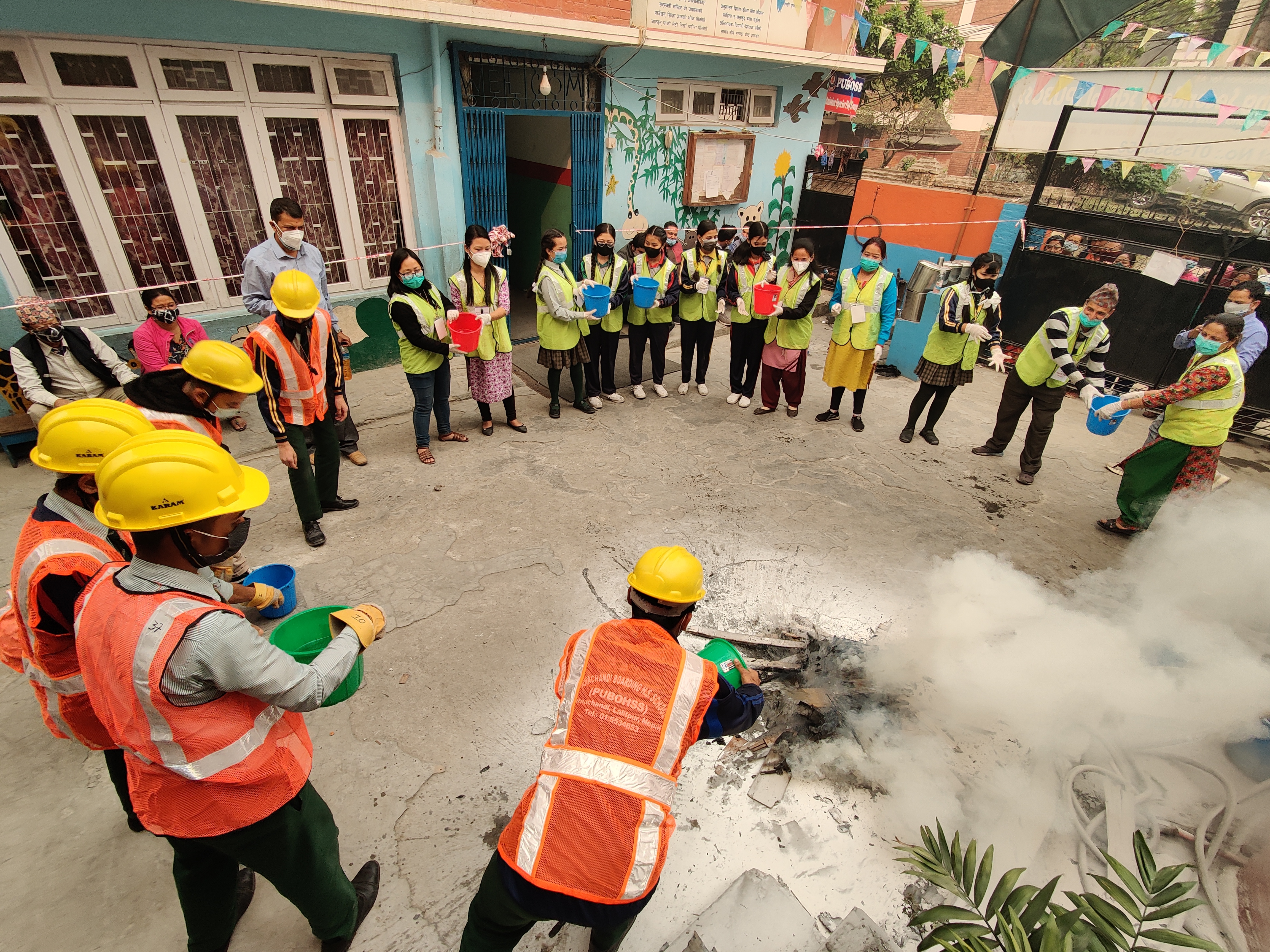[Closed]Urban Disaster Prepared Project (ECHO III)
Urban Disaster Preparedness Project (ECHO III)
| Status | Closed | ||
| Duration: | June 2019 - October 2021 | ||
| Focus area: | Urban Disaster Preparedness and Response | ||
| Source of Funding: | EU Humanitarian Aid | ||
| Implementing Entity: | UNDP | ||
| Collaborating Partners: | National Disaster Risk Reduction and Management Authority (NDRRMA), Ministry of Federal Affairs and General Administration (MoFAGA), Lalitpur Metropolitan City, Bharatpur Metropolitan City, Bhimeshwor Municipality, Project Wards, Private Hospital Association, Chamber of Commerce & Industry, Petroleum Dealers Association, Electricians & Hardware Shops, Construction Workers, LP Gas Depots, Private/Community Schools among others | ||
| Budget for total project period: | US$ 1.34 million |
Summary
With support from European Union Civil Protection and Humanitarian Aid Operations Office (EU Humanitarian Aid), UNDP is implementing this project in partnership with three municipal governments across Nepal working together to create a common understanding on urban disaster risks and supporting in addressing multi-hazard risks and to respond to potential humanitarian emergencies.
Background
Nepal is witnessing rapid urbanization and increased population in urban areas. These urban areas are also experiencing exposure to more-frequent multi-hazard risks and their impacts.
While all tiers of government are devising policies and programmes to respond to disasters, there is a need to support municipal governments to help them fully operationalize policies
and programmes with effective measures, models and capacities. Municipalities would be able to institutionalize and strengthen emergency preparedness and to plan and implement coordinated response with the assistance.
Major Achievements
- 1610 households assessed through Knowledge, Attitude and Practice (KAP) survey to gauge the understanding of the population on disaster exposure, vulnerability and risk mitigation.
- More than 16 types of IEC materials (including animations, posters, flip charts and PSAs) developed to raise awareness on disaster preparedness and response based on the KAP survey.
- Over 2024 buildings structurally assessed across all three municipalities to assess their risks to fire and earthquake hazards.
- 72 Map/Risk maps developed covering over 1570 vulnerable beneficiaries.
- More than 75 firefighters and 270 Community Emergency Response Team (CERT) volunteers trained on firefighting and life-saving skills.
- More than 880 units of Light Search & Rescue (LSAR) equipment handed over to municipalities and wards in all three districts.
- 33 different small-scale disaster risk mitigation activities implemented.
- Municipal Emergency Operation Centres (MEOCs) operationalized in all three municipalities and supported with required infrastructure for round-the-clock operation.
- Municipal Emergency Preparedness and Response Plans and Disaster Relief Guidelines drafted in all three municipalities.
- Over 9800 WASH and medical supplies distributed, 30 hand washing stations installed and a variety of IEC materials and PSAs disseminated for COVID-19 preparedness and response.
Project Outcome
The project aims to:
- Improve understanding of disaster risks at community and municipal level in selected high-risk urban areas
- Strengthen/establish systems at all levels for effective emergency response and management
- Support disaster preparedness at community and municipal level for effective emergency response and risk reduction
GESI component:
The Urban DP Project has been taking GESI strictly into consideration while carrying out all of its activities related to urban disaster preparedness and response. It has targeted and prioritized working with women groups residing in urban squatters, children with disability and hard of hearing, senior citizens, single women and vulnerable populations from poverty pockets. It has also targeted members from LGBTIQ and various diverse communities and religious groups. The reflection of their issues has also been ensured in the emergency preparedness and response plans and relief guidelines at the local level. Women volunteers are an integral part of the project’s community emergency response mechanism who serve as first responders in their communities and coordinate help during emergencies and raise awareness on disaster preparedness and response. Till date, over 220 female Community Emergency Response Team (CERT) volunteers have been trained on basic fire fighting and search and rescue through simulation exercises.
Documents
Contacts
UNDP focal point:
Pragyajan Yalambar Rai
Portfolio Manager
Email:pragyajan.rai@undp.org
Project focal point:
Sushant Sharma
Project Coordinator
Phone No: + 977-1-5004176
Email: sushant.sharma@undp.org

 Locations
Locations





